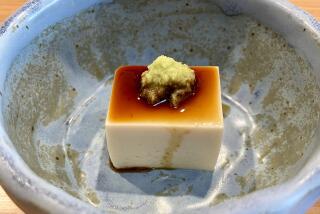Mainland Listeners Tune In to the Aloha Sound
- Share via
What in the world is Kiho’alu? It’s the Hawaiian name for slack key guitar.
If you don’t know any more now than you did before, rest assured that Hawaiians are very clear about what slack key guitar is, since it has been an essential element in the music of the islands for more than a century.
Even more knowledgeable are slack key masters Cyril Pahinui, Dennis Kamakahi and George Kahumoku Jr., all of whom will be featured in the Hawaiian Slack Key Guitar Festival on Saturday at El Camino College’s Marsee Auditorium.
For mainlanders, slack key guitar playing fits nicely into the familiar “aloha” image of Hawaiian music--soft, floating melodies, gentle rhythms and accessible harmonies. It is immensely listenable music, underpinned with a body-moving flow that makes it easy to understand its association with hula dancing.
But slack key guitar is a bit more complicated than it sounds. In fact, the label is somewhat of a misnomer, since it actually refers to slack strings, rather than slack keys. “Slacking” describes the technique of loosening strings to produce tuning different from the usual guitar tuning. Many artists have their own, often closely guarded tuning, but the most common technique is to employ combinations that add up to a major chord--creating the potential for big, resonant, open-string chords.
The most familiar use of slack key tuning is via the Hawaiian steel guitar style, in which the strings are stopped with a steel bar, allowing for sweeping, mellifluous sounds. Less familiar is the now rapidly emerging finger-picking slack key style in which the tuning allow the thumb to pluck a bass line while the other fingers play melodies across the upper strings. This latter style is what will prevail in Saturday’s program.
Pahinui, Kamakahi and Kahumoku, all in their late 40s, are among the most prominent members of a highly skilled generation of slack key guitarists. Despite their highly honed talents, however, they came to playing in characteristic Hawaiian fashion--learning by ear, by contact with revered elders, in family groupings and jam sessions.
Pahinui comes from a much-honored family of players. He’s the son of the legendary slack key guitarist Gabby Pahinui (who died in 1980). A rock musician as a youth, the younger musician performed on five of his father’s albums, and now works as a soloist and occasionally in combination with his two brothers.
“All those old songs my dad did still have a lot of meaning for me and always will,” Pahinui says. “I’ve been hearing them all my life.” Many appear on his latest album, “Night Moon” (Dancing Cat).
Kamakahi, a singer with a sweetly lyrical voice, also emphasizes the importance of family in the evolution of Hawaiian music. His latest album on Dancing Cat Records is “ ‘Ohana,” which means “family.”
“Father to son, father to son, father to son,” says Kamakahi in the notes to his CD, “passing on the feeling, the aloha for each other, for music, this is so important.”
Somewhat similarly, Kahumoku describes himself not just as a musician, but as a farmer, a storyteller and a teacher. While building his career as a slack key guitarist, he also has worked as a welder, a teacher and an advocate for native Hawaiians.
*
Like Kamakahi and Pahinui, Kahumoku has been strongly influenced by the superb slack key playing of Gabby Pahinui, as well as two still-living masters, Ray Kane and Sonny Chillingworth. But he, too, inevitably returns to the vital role that family has played in his growth as an individual and as an artist.
“When I’m playing a solo instrumental piece, especially on the 12-string guitar,” says Kahumoku, whose latest Dancing Cat album is titled “Drenched by Music,” “I often imagine in my musical mind’s eye all of the people in my family--grandparents, parents, brothers, sisters . . . that they’re all playing or singing along with me.”
The communal effort of all three artists will be on display at Marsee Auditorium, showcasing one of the world’s finest acoustic guitar traditions, one that resonates strongly with American folk and country music. And they will surely be reaching out to embrace the audience in the familial sharing of that music.
“There are many different ways to play a song,” Pahinui says. “It all depends on how you feel or what tuning you’re in, or even who else is in the room.”
* The Hawaiian Slack Key Guitar Festival, Saturday at Marsee Auditorium, El Camino College, Torrance, 8 p.m. $18 and $21 ($8 for children 12 and under). (800) 832-2787.


